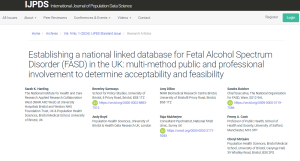The UK would benefit from a national database for foetal alcohol spectrum disorder
19 September 2024
Researchers at the University of Bristol found that stakeholders were broadly supportive of creating a national linked database for foetal alcohol spectrum disorder (FASD) in the UK. The study team consulted a variety of people, including those with FASD, their families, healthcare workers, policymakers, and researchers to understand if creating a database would be acceptable and possible. They did this through online workshops, video calls, and emails.
Current estimates suggest that 1.8-3.6 per cent of children in the UK are affected by FASD. FASD is a neurodevelopmental disorder caused by alcohol use during pregnancy. It can lead to cognitive and behavioural issues and is one of the leading causes of non-genetic developmental disability worldwide. A national database could improve our understanding of the disorder, help create better policies and services to support prevention and improve the lives of people living with FASD.
Stakeholders saw the following as potential benefits of a national FASD database:
- Increased awareness and understanding: a national database for FASD could help both the public and professionals learn more about FASD, leading to better support and awareness
- Improved diagnosis: with a lot of detailed clinical information in one place, doctors could diagnose FASD more accurately and efficiently
- Enhanced research and collaboration: the database could support national and international research collaborations, advancing global understanding of FASD
- Insight into long-term impacts: it could provide valuable insights into the long-term health, educational, social, and economic impacts on people living with FASD
However, stakeholders raised concerns about privacy and data security. They also suggested that there should be a balance between relying on ‘what the numbers say’ in the database and using doctors’ professional judgments to ensure the data supports rather than replaces the insights of healthcare professionals.
Dr Sarah Harding, lead author, said:
“Our study has shown that setting up a national linked database for FASD in the UK is both doable and supported by stakeholders.
“Moving forward, the focus will be on addressing privacy concerns and working collaboratively with a wide range of stakeholders to ensure the database meets the needs of the FASD community. This will pave the way for better outcomes for those affected by FASD and their families.”
Paper
